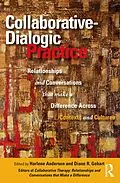Collaborative-Dialogic Practice provides professionals a humanizing approach in facilitating transformative dialogues with their clients, making a difference, and creating surprising possibilities in our fast-changing, diverse, and ever-shrinking world.
Written alongside a collection of international experts, Harlene Anderson and Diane Gehart introduce collaborative-dialogic practice as a way to encourage relationships and conversations that create generative space and promote meaningful changes in clients, even in the most difficult situations. Split into theory and practice, Part 1 introduces collaborative-dialogue and locates it within traditional and contemporary challenges and practices, providing an overview of its conceptual framework. Chapters in Part 2 then detail the practice in a variety of contexts, cultures, and diverse populations, illustrating how readers can translate the concepts to their distinctive practice settings, and their clients' unique situations.
Accessible and applicable, this book will be an essential resource and guide for professionals in diverse contexts, cultures, and disciplines, including counselors, psychotherapists, consultants, leaders, mentors, educators, and trainers.
Autorentext
Harlene Anderson, PhD, co-founder and board member of The Taos Institute and Houston Galveston Institute, and co-editor of Collaborative Therapy: Relationships and Conversations that Make a Difference (Routledge, 2006).
Diane R. Gehart, PhD, professor, California State University, Northridge; Director, Institute for Therapy that Works, and co-editor of Collaborative Therapy: Relationships and Conversations that Make a Difference (Routledge, 2006).
Klappentext
Collaborative Practice provides counselors, psychotherapists, and other mental health professionals a humanizing approach in facilitating transformative dialogues with their clients, making a difference in our fast-changing, diverse, and ever-shrinking world. Written alongside a collection of international experts, Harlene Anderson and Diane Gehart introduce collaborative-dialogic practice as a method of encouraging relationships and conversations that create generative space and promote meaningful changes in clients, even in the most difficult situations. Promoting an epistemological and mindset shift, the main feature of the practice, the philosophical stance, guides the professional in particular ways of being, talking, thinking, and acting with others, informing future possibilities that were previously unimagined. Split into theory and practice, Part 1 introduces collaborative-dialogue and locates it within traditional and contemporary challenges and practices, providing an overview of its conceptual framework. Chapters in Part 2 then detail the practice in a variety of contexts, cultures, and diverse populations, such as educational settings, communities, businesses, organizations, research and psychotherapy, illustrating how readers can translate the concepts to their distinctive practice settings, their unique styles, and their clients' unique situations. Accessible and applicable, this book will be an essential resource and guide for professionals in diverse contexts, cultures, and disciplines, including counselors, psychotherapists, consultants, leaders, mentors, educators, and trainers. Written for those new and familiar to the ideas, it will open doors for professionals to expand their competence and to take time to pause, step-back and reflect on their practice.
Inhalt
Part I: Conceptual Framework: Situating Collaborative-Dialogic Practice
- Conceptual Framework: Emerging Orienting Sensitivities for Relationships and Conversations that Invite Transformation and Possibility: Harlene Anderson, Houston, USA
- Expressions of the Philosophical Stance: Creating a Relational and Dialogic Space and Process for Generativity, Harlene Anderson, Houston, USA
- A Relationally Responsive World: The Politics of Collaborative-Dialogic Practice: Saliha Bava, New York, USA
- Dialogic Curiosity as Mindfulness Practice: Following the Moment-to-Moment Unfolding of Meaning Construction: Diane Gehart, California, USA
- This Lovely Thing We Do Together: Collaborative-Dialogic Practice through a Literary Lens: Marsha McDonough, Texas, USA
- Collaborative Practices in 21st Century Healthcare: Jenny Speice and Susan McDaniel, New York, USA
- Community In-Conversation: Generating Collaborative and Dialogic Conversations in Community Context: Adela G. Garcia, Buenos Aires, Argentina & Marilene A. Grandesso, Sao Paulo, Brazil
- Ancestral Knowledge and Postmodern Practices: Using Collaborative-Dialog to Restore Harmony in Indigenous Communities: Rocio Chaveste and Maria Luisa Molina, Merida, Mexico
- Emotional Resilience and Collective Care in the Environmental Movement: Jakub Cerny, Ostrava, Czech Republic, Lucia Cemova and Martin Kovak, Brno, Czech Republic
- Learning Through Collaboration: Practices that Challenge our Tradition of Education, Professor, University of New Hampshire, Sheila McNamee
- Collaborative Responses Within a School Community: Reflections from the Covid-19 Experience: Richard De La Cuadra & Sylvia London, USA and Mexico
- Collaborative-Dialogic Practices in Business Management: Transforming Local Communities Through Engaged Relationship: Irma Rodríguez, Sylvia London & Luis Olguín, Mexico City, Mexico
- Merging Collaborative-Dialogic Practice within the Culture of an Internet Technology (IT) Company: Its Evolution Told through a Collection of Story Fragments: Gao Yun, Dolly, HaiBo Zeng, Beijing, China and Harlene Anderson, Texas USA
- From Mechanized Systems to Living Ecologies: Way-Finding in Collaborative-Dialogic Research: Jan DeFehr, Manitoba, Canada
- Everyday Living as Inspiration for Collaborative Practices, Dan Wulff and Sally St. George, Calgary, Canada
Part II: Collaborative-Dialogic Practice in Action: Applications Across Contexts, Cultures and Disciplines
